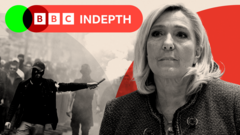As sentiments rise and political alliances shift, the implications for the National Rally and France's future unfold.
**Political Shockwaves: Marine Le Pen's Disqualification Sparks Outcry Among Far-Right Allies**

**Political Shockwaves: Marine Le Pen's Disqualification Sparks Outcry Among Far-Right Allies**
Discussion intensifies in France after Marine Le Pen is barred from the 2027 presidential election.
In a dramatic turn of events, France's far-right political landscape has been charged with outrage following a court ruling that disqualified Marine Le Pen from standing in the upcoming 2027 presidential election. The sentiment of injustice permeating through right-wing circles has prompted swift and furious reactions, aimed at leveraging this decision as a rallying cry for support.
The airwaves resonated with indignation as leaders within Le Pen's party, the National Rally (RN), took to various media platforms, urging their supporters to feel aggrieved by the court's verdict. Notably, one of Le Pen's prominent deputies emphasized, “Be outraged,” to ensure that the party’s base recognized the gravity of the situation. However, the potential outcome of this legal battle remains uncertain, as experts debate whether it will solidify support for the RN or exacerbate existing divisions among the far-right factions.
As the political turmoil unfolds, Le Pen's allies vehemently assert that the integrity of France’s democracy has been compromised. Their narrative paints Le Pen as a victim of a manipulative judicial system, with claims that critical institutions in France have been undermined. Le Pen likened her plight to that of Alexei Navalny, the Russian opposition leader, asserting that the ruling was an attempted suppression of a political contender poised to secure power.
In contrast to her fierce declarations, a pre-verdict opinion poll revealed a nuanced public response: while 37% expressed a desire to vote for Le Pen in 2027, only 31% deemed the court's ruling unjust. This suggests that support for Le Pen does not equate to a blanket endorsement of her actions.
Prime Minister François Bayrou expressed concerns regarding the ruling's potential impact on the fragile coalition government amidst fears that public sentiment could shift in unpredictable ways. Meanwhile, some centrist politicians are stressing the importance of separating judicial proceedings from political influence, seeking to stabilize potential fallout.
Le Pen's five-year ban was issued following findings of systematic fraud involving her party and the European Parliament. Evidence presented included incriminating emails that highlighted the intentionality of their actions. Legal experts noted that had Le Pen and her party showed more contrition during the trial, they might have faced lesser penalties.
Meanwhile, the broader French political elite has been criticized for exhibiting hypocrisy in their support for Le Pen. Their historical stagnation on corruption laws has only incited further ridicule from social media users who recall Le Pen’s own past stances on strict penalties for corruption.
As the dust continues to settle from the court's verdict, the future of the National Rally remains uncertain. With Le Pen’s fast-tracked appeal yet to be processed, questions linger about whether the party will retaliate in parliament, potentially destabilizing the current coalition.
Jordan Bardella, often considered Le Pen’s successor, is under scrutiny as he navigates the intricate landscape of far-right politics. He has successfully engaged younger voters disillusioned by economic conditions, but transforming this enthusiasm into concrete electoral support proves to be a complicated endeavor. Meanwhile, other political figures on the right vie for influence, adding to the uncertainty.
With Le Pen's commitment to remain a central figure in French politics, observers wonder whether her narrative of victimization will resonate with voters or if citizens will instead rally around the very institutions she seeks to undermine. As France anticipates the implications of recent events, the question remains—is this the defining moment for Marine Le Pen, or just another chapter in a long saga of electoral defeats?
The airwaves resonated with indignation as leaders within Le Pen's party, the National Rally (RN), took to various media platforms, urging their supporters to feel aggrieved by the court's verdict. Notably, one of Le Pen's prominent deputies emphasized, “Be outraged,” to ensure that the party’s base recognized the gravity of the situation. However, the potential outcome of this legal battle remains uncertain, as experts debate whether it will solidify support for the RN or exacerbate existing divisions among the far-right factions.
As the political turmoil unfolds, Le Pen's allies vehemently assert that the integrity of France’s democracy has been compromised. Their narrative paints Le Pen as a victim of a manipulative judicial system, with claims that critical institutions in France have been undermined. Le Pen likened her plight to that of Alexei Navalny, the Russian opposition leader, asserting that the ruling was an attempted suppression of a political contender poised to secure power.
In contrast to her fierce declarations, a pre-verdict opinion poll revealed a nuanced public response: while 37% expressed a desire to vote for Le Pen in 2027, only 31% deemed the court's ruling unjust. This suggests that support for Le Pen does not equate to a blanket endorsement of her actions.
Prime Minister François Bayrou expressed concerns regarding the ruling's potential impact on the fragile coalition government amidst fears that public sentiment could shift in unpredictable ways. Meanwhile, some centrist politicians are stressing the importance of separating judicial proceedings from political influence, seeking to stabilize potential fallout.
Le Pen's five-year ban was issued following findings of systematic fraud involving her party and the European Parliament. Evidence presented included incriminating emails that highlighted the intentionality of their actions. Legal experts noted that had Le Pen and her party showed more contrition during the trial, they might have faced lesser penalties.
Meanwhile, the broader French political elite has been criticized for exhibiting hypocrisy in their support for Le Pen. Their historical stagnation on corruption laws has only incited further ridicule from social media users who recall Le Pen’s own past stances on strict penalties for corruption.
As the dust continues to settle from the court's verdict, the future of the National Rally remains uncertain. With Le Pen’s fast-tracked appeal yet to be processed, questions linger about whether the party will retaliate in parliament, potentially destabilizing the current coalition.
Jordan Bardella, often considered Le Pen’s successor, is under scrutiny as he navigates the intricate landscape of far-right politics. He has successfully engaged younger voters disillusioned by economic conditions, but transforming this enthusiasm into concrete electoral support proves to be a complicated endeavor. Meanwhile, other political figures on the right vie for influence, adding to the uncertainty.
With Le Pen's commitment to remain a central figure in French politics, observers wonder whether her narrative of victimization will resonate with voters or if citizens will instead rally around the very institutions she seeks to undermine. As France anticipates the implications of recent events, the question remains—is this the defining moment for Marine Le Pen, or just another chapter in a long saga of electoral defeats?



















